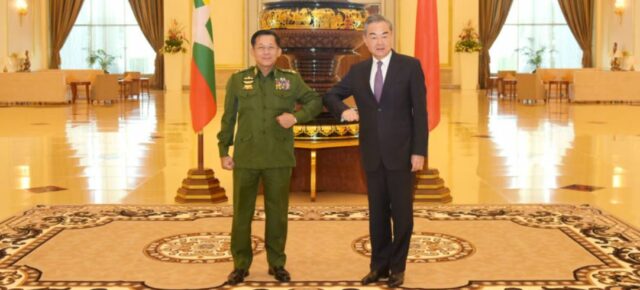Myanmar’s parallel National Unity Government (NUG) called on China to engage with them to find a solution to the country’s political crisis, while warning that any attempts to legitimise the military regime would risk undermining people to people relations between the two countries.
In its open letter to China’s State Councilor and foreign minister Wang Yi on Monday, the NUG said that they are “deeply concerned” that China and the Association of Southeast Asian Nations (ASEAN) have failed to adequately engage with the NUG in efforts to find solutions to Myanmar’s problems.
The letter said that NUG ministers “look forward to the opportunity to engage in constructive dialogue with China through both bilateral and multilateral platforms”. It also said that they are available to engage with China’s ambassador to Myanmar, Chen Hai, at his convenience.
In early April, a counselor from the Chinese embassy in Yangon spoke by phone with members of the Committee Representing Pyidaungsu Hluttaw, the NUG’s parliamentary committee.
The NUG’s call for Chinese engagement came a few days after its condemnation of ASEAN for its one-sided engagement with the junta to find solutions for Myanmar’s post-coup problems while neglecting the NUG.
Myanmar, one of ASEAN’s member countries, has suffered politically, economically and socially since the military takeover of the country. The regime has killed over 800 anti-coup protesters and with armed insurgencies in both urban and border areas, the country’s instability has become a pressing regional concern.
China has continued to support ASEAN’s efforts to address the crisis in Myanmar. However, the NUG said that there has been “little progress” so far due to the lack of a mechanism that might hold coup leader Senior General Min Aung Hlaing accountable and pressure him to proactively take steps to peacefully end the crisis through dialogue.
“Min Aung Hlaing has noted that ASEAN efforts can begin once stability is achieved in the country, and this position should be strongly rejected by both China and ASEAN. There will be no stability until the legitimate government is restored,” it said.
China hosted a Special China-ASEAN summit June 6-8th in Chongqing, marking the 30th anniversary of the first China-ASEAN Foreign Ministers Meeting, and a Lancang Mekong Cooperation (LMC) Forum Ministers Meeting. Myanmar is the co-chair with China for the meetings and junta-appointed foreign minister U Wunna Maung Lwin attended.
The NUG also said that both China and ASEAN have failed to engage with the NUG for the foreign ministers’ meeting, while the Chinese side has failed to consult the NUG and instead moved forward with preparations for the LMC with the regime.
That move, the NUG said, risks undermining Myanmar’s participation in a critical regional organization and “further threatens the ability of the LMC to address important regional security threats”.
Prior to the China-ASEAN meeting, Ambassador Chen Hai met Snr-Gen Min Aung Hlaing in Naypyitaw last Friday. The ambassador referred to the coup leader as “Myanmar leader” and reiterated China’s support for ASEAN efforts in solving Myanmar’s crisis. The reference [as Myanmar leader] sparked ire from the Myanmar people.
The NUG’s letter read, “The Chinese government should take note that the [junta-governing body] State Administrative Council established by Min Aung Hlaing does not represent the people of Myanmar, and that efforts to legitimize it as the government of Myanmar risk undermining people to people relations between the two countries.”
Shortly after the coup, China described the Myanmar military’s takeover—internationally condemned as a coup—as a “major cabinet reshuffle”. China, along with Russia, also blocked efforts by the United Nations Security Council to condemn the coup, insisting that the seizure of power from the democratically-elected government was an internal affair.
On Monday, during the China-ASEAN Foreign Ministers’ Meeting, China’s Wang Yi said that China continues to play a constructive role and supports ASEAN’s constructive engagement in Myanmar affairs as the “Myanmar situation is directly related to China’s interests”.
ASEAN set out a five-point consensus at a special summit in late April to engage with Myanmar through the appointment of a special envoy and by providing humanitarian support.
Wang Yi added that China and ASEAN share similar views regarding Myanmar’s affairs, and repeated previous Chinese calls for a cessation of violence and the holding of political dialogue. China also urged the international community to abide by the aims and policies of the United Nations Universal Charter so that it “will not act to impose one-sided sanctions and inappropriate intervention”.
(By arrangement with ‘The Irrawaddy’)
















